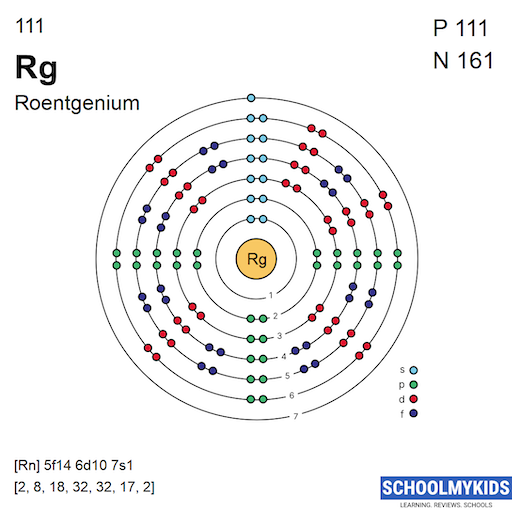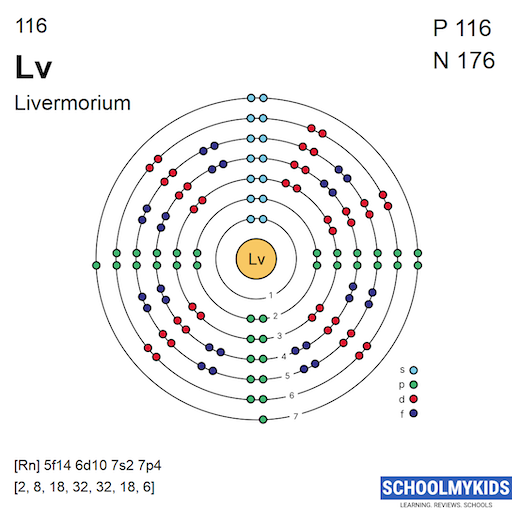Compare the elements Roentgenium and Livermorium on the basis of their properties, attributes and periodic table facts. Compare elements - Roentgenium and Livermorium comparison table side by side across over 90 properties. All the elements of similar categories show a lot of similarities and differences in their chemical, atomic, physical properties and uses. These similarities and dissimilarities should be known while we study periodic table elements. You can study the detailed comparison between Roentgenium vs Livermorium with most reliable information about their properties, attributes, facts, uses etc. You can compare Rg vs Lv on more than 90 properties like electronegativity, oxidation state, atomic shells, orbital structure, Electronaffinity, physical states, electrical conductivity and many more. This in-depth comparison helps students, educators, researchers, and science enthusiasts understand the differences and similarities between Roentgenium and Livermorium.
Roentgenium and Livermorium Comparison
| 1 | 2 | 3 | 4 | 5 | 6 | 7 | 8 | 9 | 10 | 11 | 12 | 13 | 14 | 15 | 16 | 17 | 18 |
| 1 | | | Atomic # Electronic Shell # Symbol Name Atomic Weight Metals | Metalloids | NonMetals | Alkali metals | Alkali earth metals | Lanthanoids | Transition metals | Post-transition metals | Other nonmetals | Halogens | Nobel gas | Actinoids |
| | |
| 2 | | | | | | | | |
| 3 | | | | | | | | |
| 4 | | | | | | | | | | | | | | | | | | |
| 5 | | | | | | | | | | | | | | | | | | |
| 6 | | | 57 - 71
La - Lu Lanthanides | | | | | | | | | | | | | | | |
| 7 | | | 89 - 103
Ac - Lr Actinides | | | | | | | | | | | | | | | |
| Lanthanides | | | | | | | | | | | | | | | |
| Actinides | | | | | | | | | | | | | | | |
Here's a detailed comparison between Roentgenium (Rg) and Livermorium (Lv), focusing on their position in the periodic table, physical and chemical properties, stability, and uses.
Facts - Basic Element Details
| Name | Roentgenium | Livermorium |
|---|
| Atomic Number | 111 | 116 |
| Atomic Symbol | Rg | Lv |
| Atomic Weight | 272 | 292 |
| Phase at STP | Solid | Solid |
| Color | - | - |
| Metallic Classification | Transition Metal | Post Transition Metal |
| Group in Periodic Table | group 11 | group 16 |
| Group Name | copper family | oxygen family |
| Period in Periodic Table | period 7 | period 7 |
| Block in Periodic Table | d -block | p -block |
| Electronic Configuration | [Rn] 5f14 6d10 7s1 | [Rn] 5f14 6d10 7s2 7p4 |
| Electronic Shell Structure (Electrons per shell) | 2, 8, 18, 32, 32, 17, 2 | 2, 8, 18, 32, 32, 18, 6 |
| Melting Point | - | - |
| Boiling Point | - | - |
| CAS Number | CAS54386-24-2 | CAS54100-71-9 |
| Neighborhood Elements | Neighborhood Elements of Roentgenium | Neighborhood Elements of Livermorium |
History
| Parameter | Roentgenium | Livermorium |
|---|
| History | The element Roentgenium was discovered by S. Hofmann et al.(GSI in Darmstadt) in year 1995 in Germany. Roentgenium derived its name from Wilhelm Conrad Röntgen, physicist. | The element Livermorium was discovered by Yuri Oganessian et al.(JINR in Dubna) in year 2004 in Russia. Livermorium derived its name from Lawrence Livermore National Laboratory (in Livermore, California) which collaborated with JINR on its synthesis. |
| Discovery | S. Hofmann et al.(GSI in Darmstadt) (1995) | Yuri Oganessian et al.(JINR in Dubna) (2004) |
| Isolated | () | () |
Presence: Abundance in Nature and Around Us
Parts per billion (ppb) by weight / by atoms (1ppb =10^-7 %)
Crystal Structure and Atomic Structure
Atomic and Orbital Properties
| Property | Roentgenium | Livermorium |
|---|
| Atomic Number | 111 | 116 |
| Number of Electrons (with no charge) | 111 | 116 |
| Number of Protons | 111 | 116 |
| Mass Number | 272 | 292 |
| Number of Neutrons | 161 | 176 |
| Shell structure (Electrons per energy level) | 2, 8, 18, 32, 32, 17, 2 | 2, 8, 18, 32, 32, 18, 6 |
| Electron Configuration | [Rn] 5f14 6d10 7s1 | [Rn] 5f14 6d10 7s2 7p4 |
| Valence Electrons | 6d10 7s1 | 7s2 7p4 |
| Oxidation State | - | - |
| Atomic Term Symbol (Quantum Numbers) | 2S1/2 | 3P2 |
| Shell structure |  |  |
Isotopes and Nuclear Properties
Roentgenium has 0 stable naturally occuring isotopes while Livermorium has 0 stable naturally occuring isotopes.
| Parameter | Roentgenium | Livermorium |
|---|
| Known Isotopes | 272Rg, 273Rg, 274Rg, 275Rg, 276Rg, 277Rg, 278Rg, 279Rg, 280Rg, 281Rg, 282Rg, 283Rg | 289Lv, 290Lv, 291Lv, 292Lv |
| Stable Isotopes | - | |
| Neutron Cross Section | - | - |
| Neutron Mass Absorption | - | - |
Chemical Properties: Ionization Energies and electron affinity
Physical Properties
| Property | Roentgenium | Livermorium |
|---|
| Phase at STP | Solid | Solid |
| Color | - | - |
| Density | - | - |
| Density (when liquid (at melting point)) | - | - |
| Molar Volume | - | - |
Mechanical and Hardness Properties
Thermal and Electrical Conductivity
Magnetic and Optical Properties
Thermal Properties - Enthalpies and thermodynamics
Regulatory and Health - Health and Safety Parameters and Guidelines
Compare Roentgenium and Livermorium With Other Elements
Compare Roentgenium and Livermorium with other elements of the periodic table. Explore howRoentgenium and Livermorium stack up against other elements of the periodic table. Use our interactive comparison tool to analyze 90+ properties across different metals, non-metals, metalloids, and noble gases. Understanding these differences is crucial for applications in engineering, chemistry, electronics, biology, and material science.
Compare Roentgenium with all Group 11 elementsCompare Roentgenium with all Period 7 elementsCompare Roentgenium with all Transition Metal elements | Compare Livermorium with all Group 16 elementsCompare Livermorium with all Period 7 elementsCompare Livermorium with all Post Transition Metal elements |


